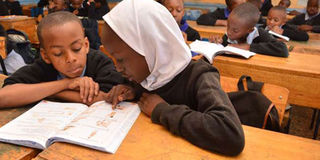School mental health care plan should be Matiang’i’s next step

Pupils of Moi Avenue Primary in Nairobi read during class time on January 4, 2017. The mental wellbeing of our young people is crucial. PHOTO | DENNIS ONSONGO | NATION MEDIA GROUP
What you need to know:
- But in reality the way to restore sanity is to pay attention to the students and listen to them.
- The figures show that young people are affected disproportionately, with over half of mental health problems starting by the age of 14 and 75 per cent by age 18.
Education Cabinet Secretary Fred Matiang’i’s name has been on everyone’s lips after he announced KCPE and KCSE examination results in record time — which was attributed to reforms that he outlined in May last year.
Around the time the reforms were announced, there were more than 100 arson attacks in schools across the country.
Most students from the affected schools said that was an attempt at drawing attention to their grievances — such as overly-strict school rules, poor diet, teacher transfers and lack of opportunity for dialogue between them and school heads.
This drastic action appeared to be a cry for help and an indication of the lack of coping mechanisms by the youth.
High school students are often misunderstood by adults as having nothing to worry about but their books and exams.
This leads many parents and teachers to put enormous pressure on students.
This adult pressure, coupled with peer pressure and the biological changes associated with puberty, can cause anxiety, depression and esteem issues among students.
Students, therefore, need a space where they can air this out.
Most schools in Kenya have a teacher or two assigned the additional responsibilities of a “guidance and counselling” patron, who have a mandate to engage with students and aid them in their decision-making.
However, most of them are not trained; neither do they have enough time to focus on the role amid their regular teaching duties.
Therefore, they do not give the required guidance and counselling needed by this specific age group.
Instead, many rely on organising talks, where “motivational speakers” come to speak to the students.
Rarely do the students have the opportunity to express their feelings and resolve their concerns, however.
MENTAL HEALTH
In the past, corporal punishment was seen as the only way to deal with disobedient students and, though banned, some Kenyans argue it would ‘bring back sanity’ in schools.
But in reality the way to restore sanity is to pay attention to the students and listen to them.
The school fires is a warning sign; the students’ way of saying “We are human and, like any human being, we have issues, and since we don’t know where and how to deal with them, this is us hoping to be heard”.
The mental wellbeing of our young people is crucial.
British Prime Minister Theresa May, in her first major speech of the year, said mental health had been “dangerously disregarded”.
In Britain, one in four people has a mental disorder at some point.
The figures show that young people are affected disproportionately, with over half of mental health problems starting by the age of 14 and 75 per cent by age 18.
The PM announced plans to train teachers in the UK to spot mental health problems in students and incorporate digital mental health services such as online self-checking.
This is something Kenya could borrow and tailor for our context.
Dr Matiang’i has shown that old ways and methods of doing things can be changed and improved, and so, our approach to mental healthcare can be changed too.
We should, as part of the reforms of the education sector, explore different tools and skills for teachers and students — including giving them a safe space to talk and incorporating students in decision-making.
This would go a long way in recognising individual potential, developing healthy, resilient and productive adults and seeing how that contributes to the benefit of the wider community.
However, this plan will need an inclusive and collaborative effort by all the stakeholders — health, education, curriculum development, trade unions, support staff and students.
And the effort will be worth it: It will not only help the students through school life but they will acquire skills to use in their adult life.
Ms Wafula is a 2016 Aspen New Voices fellow and the founder and executive director of My Mind, My Funk, a mental health information and support hub that ran Kenya’s first free mental health support line. Email: [email protected]





